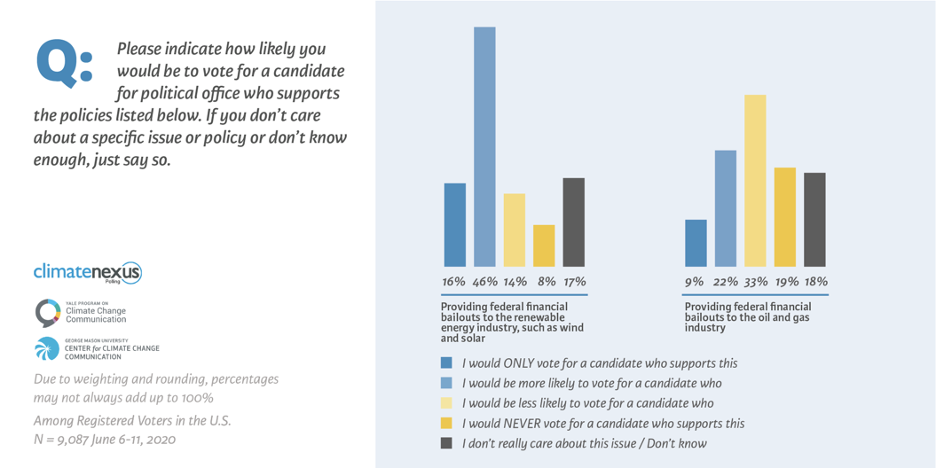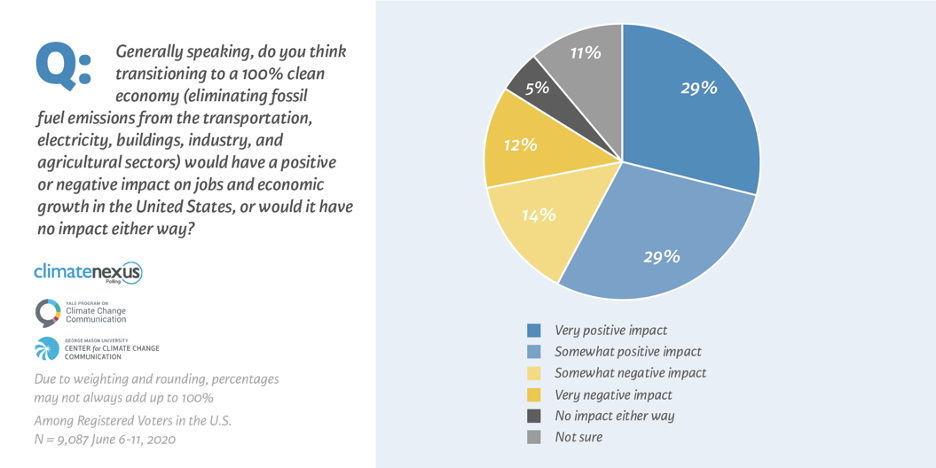Blog · June 29, 2020
New Poll: Voters Support Stimulus for Clean Energy, Not Fossil Fuels
We are pleased to release the results of a new national survey. We find that, in response to the COVID-19 pandemic and economic crisis, voters want climate action as part of the economic recovery plan and are more likely to vote for candidates that support renewable energy. The survey was conducted with Climate Nexus and the George Mason University Center for Climate Change Communication.
Seven in 10 (70%) voters say federal stimulus funding should prioritize the clean energy industry over the fossil fuel industry. Further, about six in 10 (62%) voters say they would be more likely to vote for a candidate who supports federal stimulus funding for the renewable energy industry, twice the number of voters who say they would be more likely to vote for a candidate who supports bailing out the fossil fuel industry (31%).
Roughly two-thirds of voters also say they would be more likely to vote for candidates who support the following policies: assistance to communities losing jobs in the fossil fuel industry (69%), ensuring protection of low-income communities and communities of color that are most vulnerable to climate impacts (67%), a carbon tax (65%), and requiring electric utility companies to generate 100% of their electricity from clean sources by 2040 (65%).
Additionally, voters want to see conditions placed on companies that receive stimulus funding. Eighty-six percent of voters say companies that receive funding must use the money to keep workers on payroll. About eight in 10 say companies that receive federal stimulus funding must comply with environmental and labor regulations (80%), and that these companies should not be run by members of Congress, the executive branch, or their family members (78%). And seven in 10 (70%) say airline companies that receive stimulus funding must create and implement a greenhouse gas emissions reduction plan.
About seven in 10 (71%) voters support legislation to achieve a 100% clean economy by eliminating fossil fuel emissions from the transportation, electricity, buildings, industry, and agricultural sectors in the United States by 2050. By more than a two-to-one margin, voters believe this transition will have a positive (58%) rather than a negative (26%) impact on jobs and economic growth.
There is also broad support for a variety of investments in clean transportation, including electric vehicles, and expanding access to transportation. Close to three-quarters (73%) support setting stronger fuel efficiency standards for cars, trucks, and SUVs, and about seven in 10 support federal funding to expand public transportation (72%) and replace gas- and diesel-powered buses with electric buses (69%). More than six in 10 support federal funding to build electric vehicle charging infrastructure (65%) and electric vehicles and parts (62%).
Voters are also strongly in favor of public investments to modernize the power grid and encourage consumer energy efficiency. More than three-quarters support federal funding to upgrade the electric grid and expand the production of renewable energy (78%), help state and local governments improve the energy efficiency of new and existing buildings (78%), and install solar panels to reduce electricity bills in low-income communities (77%).
Voters also support increased funding to protect against climate impacts, particularly in low-income communities and communities of color. Nearly three-quarters (73%) support increasing federal funding to protect vulnerable low-income communities and communities of color from immediate environmental dangers and extreme weather. And roughly two-thirds (66%) support creating a National Climate Bank to fund public and private sector projects to reduce carbon pollution and prepare communities to withstand the effects of climate change.
The full report includes many other important findings, including public support for clean water, public lands, agriculture, forestry, and carbon removal policies.
The poll was conducted June 6-11, 2020 with a representative sample of 9,087 registered voters in the United States. The margin of error is +/- 1% at the 95% confidence level.

